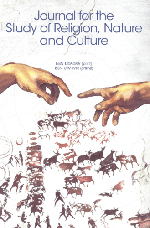Critical theories have been important for Humanities discussions over the past several decades. In a sense, these theories have offered critiques of Enlightenment models of knowledge and reality. They suggest that any single explanatory system cannot exhaust the multiple perspectives of people’s experiences of the world, much less the experiences and lives of other animals, plants and the rest of the natural world. These theories have largely uncovered the history of “Enlightenment” thinking as white, heteronormative, anthropocentric understandings that are located in particular historical-cultural locations and projected as (more or less) universal. Critical race theories, queer theories, new materialisms, affect theories as well as postcolonial and deconstructive theories have challenged the naturalization of categories of identity, knowledge, and “nature.” Most often such categories are “fixed” by discourse about nature (what is “natural”) and/or discourse about what is right/wrong, good/bad etc. They often draw from revealed or experienced truths found in religious traditions.
With some exceptions, critical theories have been largely overlooked or dismissed by conversations taking place in environmental ethics and religion and ecology/nature. Partly, this is due to the perception on the part of ecologically minded scholars that critical theory focuses almost solely on linguistics and humanity, a “humanism” that is largely critiqued from ecological circles. Partly, the dismissal is due to an ethical imperative on the part of environmentalists: we simply don’t have time to get lost in theory and argue about words when species are dying and the planet is rapidly changing. On the side of critical theory, there has been a tendency to focus solely on the level of human-construction of knowledge and language and an attitude of naiveté towards those who think there is something like a “nature” or “reality” to be saved or preserved.
Philosophers of science such as Donna Harraway and Karen Barad, eco-critics such as Timothy Morton, and environmental studies scholars such as Catriona Sandilands, critical race theorists such as Michelle Wright, affect theorists such as Mel Chen, and postcolonial theorists such as Rob Nixon have all begun to bring critical theories to bear on issues surrounding our understanding of nature. At the same time queer theory, new materialisms, affect theory, critical race theory, and postcolonial theories have long been a part of discussions in religious studies. This working group asks why such theories should matter for religious and ethical issues surrounding the degradation of the planet and the lives therein.
To learn more about this group or to get involved contact Whitney Bauman.









